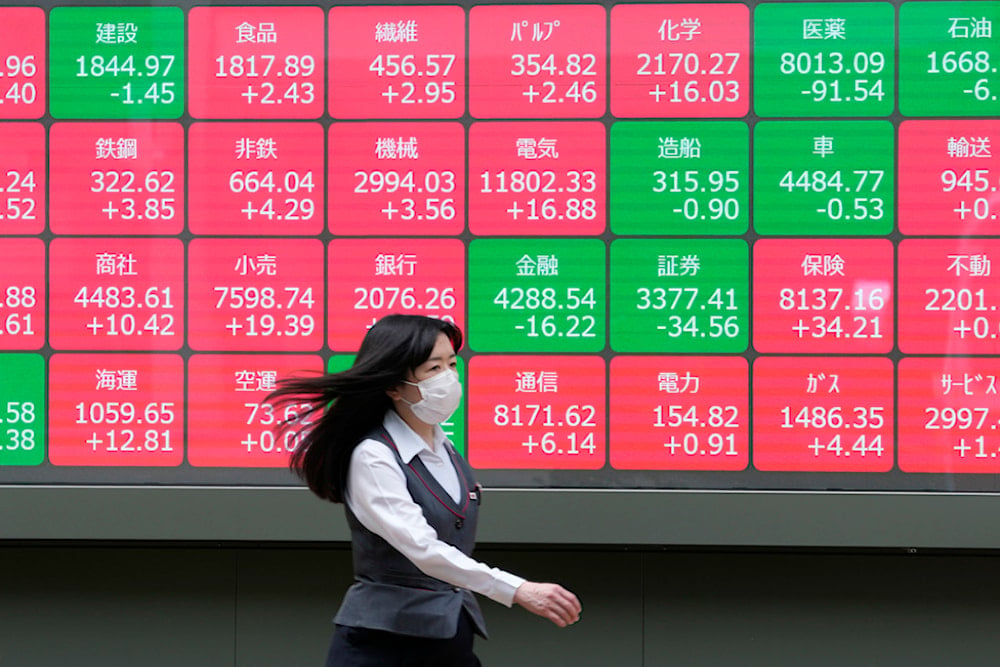Tokyo stocks see technical rebound following major drop
Tokyo's stocks are witnessing natural rebounds and spikes amid major concerns regarding the stability of the US economic market.
-

People walk past an electronic stock board showing the sectors' index of Japanese stocks outside a securities firm in Tokyo, on June 7, 2024. (AP)
Tokyo stocks spiked on Tuesday following concerns of an unstable US economy in the face of a stronger Yen.
The Nikkei 225 index closed up the trading session 9.40% higher, adding 2,957.90 points to reach a total of 34,416.32. Earlier in the day, it had risen more than 10%. The Topix index also went up by 9.30%, gaining 207.06 points to reach 2,434.21.
On Monday, Nikkei had a significant drop of over 12%, losing 4,451.28 points, which was the biggest points drop it has ever experienced.
Prime Minister Fumio Kishida said the stock swings, which are expected to continue fluctuating in the upcoming days, should be handled with composure. "We will continue to monitor the situation with a sense of urgency and to carry out economic and fiscal management in close cooperation with the Bank of Japan."
Nomura Securities and Monex, the leading securities and investments firms in Japan, said that the stock market would remain highly volatile for the rest of the week. Nomura described the gain the market saw following the abrupt drop as a "technical rebound", while Monex said a natural financial rebound must be underway "while the dollar-yen moves towards the yen's depreciation."
The yen fluctuated, reaching 144.75 against the dollar in late morning, compared to 146.28 earlier.
On Monday, the yen had strengthened to 141.70 against the dollar, its highest level since early January.
Major stocks soar in Tokyo, US
Major Japanese stocks saw significant increases on Tuesday.
Honda's stock surged 16.58% to 1,459 yen after a report that it was expected to announce a record quarterly profit.
Toyota's stock rose 12.72% to 2,516 yen, Sony Group's stock went up 9.08% to 12,310 yen, and Nintendo's stock increased 13.56% to 7,503 yen.
Semiconductor companies also did well, with Tokyo Electron's stock climbing 16.75% to 25,750 yen and Advantest's stock rising 14.51% to 6,084 yen.
Similarly, US defense corporation Lockheed Martin reportedly saw a significant rise in its market capitalization during Friday's trading, with its stock reaching $560 before easing to $548.
The shares, which had previously climbed from $474 in late July to a peak above $548 in early August, surged following the company's strong Q2 financial results, which saw a 9% annual increase. Since the launch of Operation Al-Aqsa Flood on October 7, 2023, Lockheed Martin's stock has steadily increased, driven by investor expectations of greater defense spending amid the growing Middle Eastern unrest.
JP Morgan's Seth Seifman suggested that the stock's rise could be attributed to the increased demand for defense services in a volatile global environment.
Read more: Wall Street stocks drop as Intel announces major layoffs
Israeli stocks continue to plunge as Iran's retaliation looms
In contrast, Israeli stocks plunged the most since October due to fears of potential retaliation from Iran and the Axis of Resistance, coupled with broader global market unease, according to a Bloomberg report. The TA-35 Index dropped by up to 3.1% and was down 2.6% as of 10:24 am in Tel Aviv. This decline follows a 3.3% decrease last week, bringing the index to its lowest point since February.
While "Israel" awaits the Axis' retaliation, the US has deployed additional forces and is advocating for a ceasefire in Gaza.
Regarding the occupation, Bloomberg reported that the Israeli shekel weakened for the sixth consecutive day, falling to 3.83 per dollar by 4:30 pm in Tel Aviv, its lowest since November. Similarly, Israeli stocks have reached their lowest level since April, which was also influenced by a global downturn in equity markets.
Moreover, Reuters reported on Monday that the stock markets in the Middle East closed lower, with Dubai's index experiencing the steepest decline due to concerns about a potential US recession and escalating regional conflicts. The Dubai index fell 4.5%, its largest single-day drop since May 2022, driven by a 7.6% decrease in shares of Emaar Properties. The Abu Dhabi index dropped 3.4%, impacted by a 7.3% fall in First Abu Dhabi Bank's stock.
The plunge was similar in each of Saudi Arabia, Egypt, and Qatar.

 4 Min Read
4 Min Read








